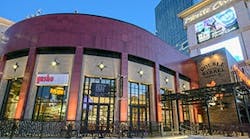Las Vegas attracts tourists with affordable buffets, trendy lounges, and hip restaurants so it’s no surprise that food waste is on the mind of facility managers along the Strip.
MGM Resorts International has 15 properties that include hundreds of food venues ranging from casual to fine dining. They also serve 40,000 meals every day in their employee cafeterias.
The hospitality company received two 2014 Food Recovery Challenge awards for improving food recovery. This EPA program helps participants “reduce wasted food through prevention, donation, composting, and anaerobic digestion to conserve natural resources.”
MGM Resorts diverted a total of 25,398 tons of food in 2013, a 50% increase over 2012 levels. The MGM Grand Hotel took top honors for increasing food diversion by 161%. Other notable reductions include 106% by New York-New York, 76% by the Bellagio, 66% at the Monte Carlo, and 30% for the Luxor.
“Food waste is part of our larger waste management program to improve diversion rates and asset recovery,” explains Chris Brophy, vice president of corporate sustainability.
As neither the city of Las Vegas nor Clark County offer composting services, MGM Resorts works with a private hauler that collects organic waste. The company also partners with a local pig farmer who can turn scraps into animal feed.
Food recovery starts at the kitchen level where staff collect trimmings into composting bins. In the employee dining rooms at the Aria and Mirage properties, workers separate scraps as they return their trays. To capture waste from restaurant leftovers, both uneaten food and table scraps, every trash bag is brought to the property’s back dock for sorting.
This process ensures that both food and recyclables are separated from garbage before leaving the facility. Bones and seafood shells must also be rescued from the compostables. Depending on the dock’s configuration, some spaces use waste compactors or dumpsters specifically for organic waste and others have totes that are emptied by vacuum trucks.
“We have been mindful to ensure the food recovery program doesn’t detract from the guest experience or burden employee workloads,” Brophy notes. “We’ve found that education is key. Separating food doesn’t require more time, but it does necessitate a change in workflow.”
MGM Resorts has a dedicated team of sustainability professionals and recently earned LEED Gold for six sites. They also participate in the Green Key program, an eco-label for hospitality, and have five resorts at the highest rating. Participating in the EPA’s Food Recovery Challenge was another avenue to validate its efforts through a third party.
For building owners looking to add food recovery to their operations, Brophy recommends taking a strategic approach. Take your time and evaluate how you can manage your waste streams while securing cost savings. “Don’t be afraid to try – there are many options that allow you to start small and grow from there,” stresses Brophy. “Customize your processes at each site and then standardize the program across your portfolio to maximize its value.”


